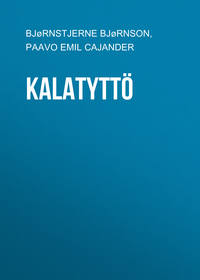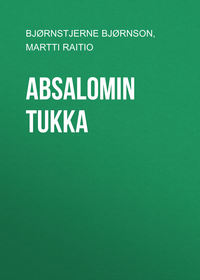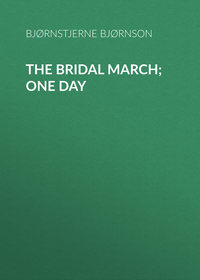 полная версия
полная версияAbsalom's Hair
and he ran to meet her.
He never dared to do more than to take both her chubby brown hands, nor to say more than "You are very sweet, you are very very good." And she never went further than to look at him, walk with him, laugh with him, and say to him, "You are not like the others." What experiences there had been in the life of this girl of thirteen goodness alone knows. He never asked her, he was too sure of her.
He learned French from her as one bird feeds from another's bill, or as one who looks at his image in a fountain, as he drinks from it.
One day, as mother and son were at breakfast, she glanced quietly across at him. "I heard of an excellent preparatory school of mechanics at Rouen," she said, "so I wrote to inquire about it, and here is the answer. I approve of it in all respects, as you will do when you read it. I think that we shall go to Rouen; what do you say to it?"
He grew first red, then white; then put down his bread, his table napkin; got up and left the room. Later in the day she asked him whether he would not read the letter; he left her without answering. At last, just as he was going to meet Lucie on the quay, she said, and this time with determination, that they were to leave in the course of an hour. She had already packed up; as they stood there the man came to fetch the luggage. At that moment he felt that he could thoroughly understand why his father had beaten her.
As they sat in the carriage which took them to the station he suffered keenly. It could not nave been worse, he thought, if his mother had stabbed him with a knife. He did not sit beside her in the railway carriage.
During the first days at Rouen he would not answer when she spoke to him, nor ask a single question. He had adopted her own tactics; he carried them through with a cruelty of which he was not aware.
For a long time he had been disposed to criticise her; now that this criticism was extended to all that she said or did, the spirit of accusation tinctured her whole life; their joint past seemed altered and debased.
His father's bent form, in the log chair on the hairless skin, malodorous and dirty, rose up before him, in vivid contrast with his mother in her well appointed, airy, perfumed rooms!
When Rafael stood by his father's body he had felt the same thing—that the old man had been badly treated. He himself had been encouraged to neglect his father, to shun him, to evade his orders. At that time he had laid the blame on the people on the estate; now he put it all down to his mother's account. His father had certainly adored her once, and this feeling had changed into wild self-consuming hatred. What had happened? He did not know; but he could not but admit that his mother would have tried the patience of Job.
He pictured to himself how Lucie would come running with her flowers, search for him over the whole quay, farther and farther every time, standing still at last. He could not think of it without tears, and without a feeling of bitterness.
But a child is a child. It was not a life-long grief. As the place was new and historically interesting, and as lessons had now begun and his mother was always with him, this feeling wore off, but the mutual restraint was still there. The critical spirit which had first been roused in England never afterwards left Rafael.
The hours of study which they passed together produced good results. Beginning as her pupil, he had ended by becoming her teacher. She was anxious to keep up with him, and this was an advantage to him, on account of her almost too minute accuracy, but still more from her intelligent questions. Apart from study they passed many pleasant hours together, but they both knew that something was missing in their conversation which could never be there again.
At longer or shorter intervals a shy silence interrupted this intercourse. Sometimes it was he, sometimes she, who, for some cause or other, often a most trivial one, elected not to reply, not to ask a question, not to see. When they were good friends he appreciated the best side of her character, the self-sacrificing life which she led for him. When they were not friends it was exactly the opposite. When they were friends, he, as a rule, did whatever she wished. He tried to atone for the past. He was in the land of courtesy and influenced by its teaching. When he was not friends with her he behaved as badly as possible. He early got among bad companions and into dissipated habits; he was the very child of Rebellion. At times he had qualms of conscience on account of it.
She guessed this, and wished him to guess that she guessed it.
"I perceive a strange atmosphere here, fie! Some one has mixed their atmosphere with yours, fie!" And she sprinkled him with scent.
He turned as red as fire and, in his shame and misery, did not know which way to look. But if he attempted to speak she became as stiff as a poker, and, raising her small hand, "Taisez-vous des egards, sil vous plait."
It must be said in her excuse that, notwithstanding the daring books which she had written, she had had no experience of real life; she knew no form of words for such an occasion. It came at last to this pass, that she, who had at one time wished to control his whole life and every thought in it, and who would not share him with any one, not even with a book, gradually became unwilling to have any relations with him outside his studies.
The French language especially lends itself to formal intercourse and diplomacy. They grasped this fact from the first. It may, indeed, have contributed to form their mutual life. It was more equitable and caused fewer collisions. At the slightest disagreement it was at once "Monsieur mon fils" or simply "Monsieur," or "Madame ma mere," or "Madame."
At one time his health seemed likely to suffer: his rapid growth and the studies, to which she kept him very closely, were too much for his strength.
But just then something remarkable occurred. At the time when Rafael was nineteen he was one day in a French chemical factory, and, as it were in a flash, saw how half the power used in the machinery might be saved. The son of the owner who had brought him there was a fellow-student. To him he confided his discovery. They worked it out together with feverish excitement to the most minute details. It was very complex, for it was the working of the factory itself which was involved. The scheme was carefully gone into by the owner, his son, and their assistants together, and it was decided to try it. It was entirely successful; LESS than half the motive power now sufficed.
Rafael was away at the time that it was inaugurated; he had gone down a mine. His mother was not with him; he never took her down mines with him. As soon as ever he returned home he hurried off with her to see the result of his work. They saw everything, and they both blushed at the respect shown to them by the workmen. They were quite touched when, the owner being called, they heard his expressions of boundless delight. Champagne flowed for them, accompanied by the warmest thanks. The mother received a beautiful bouquet. Excited by the wine and the congratulations, proud of his recognition as a genius, Rafael left the place with his mother on his arm. It seemed to him as though he were on one side, and all the rest of the world on the other. His mother walked happily beside him, with her bouquet in her hand. Rafael wore a new overcoat—one after his own heart, very long and faced with silk, and of which he was excessively proud. It was a clear winter's day; the sun shone on the silk, and on something more as well.
"There is not a speck on the sky, mother," he said.
"Nor one on your coat either," she retorted; for there had been a great many on his old one, and each had had its history.
He was too big now to be turned to ridicule, and too happy as well. She heard him humming to himself: it was the Norwegian national air. They came back to the town again as from Elysium. All the passers-by looked at them: people quickly detect happiness. Besides Rafael was a head taller than most of them and fairer in complexion. He walked quickly along beside his elegant mother, and looked across the Boulevard as though from a sunny height.
"There are days on which one feels oneself a different person," he said.
"There are days on which one receives so much," she answered, pressing his arm.
They went home, threw aside their wraps, and looked at one another. Sketches of the machinery which they had just seen lay about, as well as some rough drawings. These she collected and made into a roll.
"Rafael," she said, and drew herself up, half laughing, half trembling, "kneel; I wish to knight you."
It did not seem unnatural to him; he did so.
"Noblesse oblige," she said, and let the roll of paper approach his head; but therewith she dropped it and burst into tears.
He spent a merry evening with his friends, and was enthusiastically applauded. But as he lay in bed that night he felt utterly despondent. The whole thing might, after all, have been a mere chance. He had seen so much, had acquired so much information; it was no discovery that he had made. What was it, then? He was certainly not a genius; that must be an exaggeration. Could one imagine a genius without a victor's confidence, or had his peculiar life destroyed that confidence? This anxiety which constantly intruded itself; this bad conscience; this dreadful, vile conscience; this ineradicable dread; was it a foreboding? Did it point to the future?
It was about half a year after this that his desultory studies became concentrated on electricity, and after a time this took them to Munich. During the course of these studies he began to write, quite spontaneously. The students had formed a society, and Rafael was expected to contribute a paper. But his contribution was so original that they begged him to show it to the professor, and this encouraged him greatly. It was the professor, too, who had his first article printed. A Norwegian technical periodical accepted a subsequent one, and this was the external influence which turned his thoughts once more towards Norway. Norway rose before him as the promised land of electricity. The motive power of its countless waterfalls was sufficient for the whole world! He saw his country during the winter darkness gleaming with electric lustre. He saw her, too, the manufactory of the world, the possessor of navies. Now he had something to go home for!
His mother did not share his love for their country, and had no desire to live in Norway. But the money which she had saved up for his education bad been spent long ago. Hellebergene had had its share. The estate did not yield an equivalent, for it was essentially a timbered estate, and the trees on it were still immature.
So it was to be home! A few years alone at Hellebergene was just what he wished for. But—something always occurred to prevent their departure at the time fixed for it. First he was detained by an invention which he wished to patent. Up to the present time he had only sketched out ideas which others had adopted; now it was to be different. The invention was duly patented and handed over to an agent to sell; but still they did not start. What was the hindrance? Another invention with a fresh patent more likely to sell than the first, which unfortunately did not go off. This patent was also taken out, which again cost money, and was handed over to the agent to be sold. Could he not start now? Well, yes, he thought he could. But Fru Kaas soon realised that he was not serious, so she sought the help of a young relative, Hans Ravn, an engineer, like most of the Ravns. Rafael liked Hans, for he was himself a Ravn in temperament, a thing that he had not realised before; it was quite a revelation to him. He had believed that the Ravns were like his mother, but now found that she greatly differed from them. To Hans Ravn Fru Kaas said plainly that now they must start. The last day of May was the date fixed on, and this Hans was to tell every one, for it would make Rafael bestir himself, his mother thought, if this were known everywhere. Hans Ravn spread this news far and near, partly because it was his province to do so, partly because he hoped it would be the occasion of a farewell entertainment such as had never been seen. A banquet actually did take place amid general enthusiasm, which ended in the whole company forming a procession to escort their guest to his house. Here they encountered a crowd of officers who were proceeding home in the same manner. They nearly came to blows, but fraternised instead, and the engineers cheered the officers and the officers the engineers.
The next day the history of the two entertainments and the collision between the guests went the round of the papers.
This produced results which Fru Kaas had not foreseen. The first was a very pleasant one. The professor who had had Rafael's first article published drove up to the door, accompanied by his family. He mounted the stairs, and asked her if she would not, in their company, once more visit the prettiest parts of Munich and its vicinity. She felt flattered, and accepted the invitation. As they drove along they talked of nothing but Rafael: partly about his person, for he was the darling of every lady, partly about the future which lay before him. The professor said that he had never had a more gifted pupil. Fru Kaas had brought an excellent binocular glass with her, which she raised to her eyes from time to time to conceal her emotion, and their hearty praise seemed to flood the landscape and buildings with sunshine.
The little party lunched together, and drove home in the afternoon.
When Fru Kaas re-entered her room, she was greeted by the scent of flowers. Many of their friends who had not till now known when they were to leave had wished to pay them some compliment. Indeed, the maid said that the bell had been ringing the whole morning. A little later Rafael and Hans Ravn came in with one or two friends. They proposed to dine together. The sale of the last patent seemed to be assured, and they wished to celebrate the event. Fru Kaas was in excellent spirits, so off they went.
They dined in the open air with a number of other people round them. There was music and merriment, and the subdued hum of distant voices rose and fell in the twilight. When the lamps were lighted, they had on one side the glare of a large town, on the other the semi-darkness was only relieved by points of light; and this was made the subject of poetical allusions in speeches to the friends who were so soon to leave them.
Just then two ladies slowly passed near Rafael's chair. Fru Kaas, who was sitting opposite, noticed them, but he did not. When they had gone a short distance they stood still and waited, but did not attract his attention. Then they came slowly back again, passing close behind his chair, but still in vain. This annoyed Fru Kaas. Her individuality was so strong that her silence cast a shadow over the whole party; they broke up.
The next morning Rafael was out again on business connected with the patent. The bell rang, and the maid came in with a bill; it had been brought the previous day as well, she said. It was from one of the chief restaurateurs of the town, and was by no means a small one. Fru Kaas had no idea that Rafael owed money—least of all to a restaurateur. She told the maid to say that her son was of age, and that she was not his cashier. There was another ring—the maid reappeared with a second bill, which had also been brought the day before. It was from a well-known wine merchant; this, too, was not a small one. Another ring; this time it was a bill for flowers and by no means a trifle. This, too, had been brought the day before. Fru Kaas read it twice, three times, four times: she could not realise that Rafael owed money for flowers—what did he want them for? Another ring; now it was a bill from a jeweller. Fru Kaas became so nervous at the ringing and the bills that she took to flight. Here, then, was the explanation of their postponed departure: he was held captive; this was the reason for all his anxiety about selling the patent. He had to buy his freedom. She was hardly in the street when an unpretending little old woman stepped up to her, and asked timidly if this might be Frau von Kas? Another bill, thought Fru Kaas, eyeing her closely. She reminded one of a worn-out rose-bush with a few faded blossoms on it: she seemed poor and inexperienced in all save humility.
"What do you want with me?" inquired Fru Kaas sympathetically, resolved to pay the poor thing at once, whatever it might be.
The little woman begged "Tausend Mal um Verzeihung," but she was "Einer Beamten-Wittwe" and had read in the paper that the young Von Kas was leaving, and both she and her daughter were in such despair that she had resolved to come to Frau von Kas, who was the only one—and here she began to cry.
"What does your daughter want from me?" asked Fru Kaas rather less gently.
"Ach! tausend Mal um Verzeihung gnadige Frau," her daughter was married to Hofrath von Rathen—"ihrer grossen Schonheit wegen"—ah, she was so unhappy, for Hofrath von Rathen drank and was cruel to her. Herr von Kas had met her at the artists' fete—"Und so wissen Sie zwei so junge, reizende Leute." She looked up at Fru Kaas through her tears—looked up as though from a rain-splashed cellar window; but Fru Kaas had reverted to her abrupt manner, and as if from an upper storey the poor little woman heard, "What does your daughter want with my son?"
"Tausend Mal um Verzeihung," but it had seemed to them that her daughter might go with them to Norway, Norway was such a free country. "Und die zwei Jungen haben sich so gern."
"Has he promised her this?" said Fru Kaas, with haughty coldness.
"Nein, nein, nein," was the frightened reply. They two, mother and daughter, had thought of it that day. They had read in the paper that the young Von Kas was going away. "Herr Gott in Himmel!" if her daughter could thus be rid at once of all her troubles! Frau von Kas had not an idea of what a faithful soul, what a tender wife her daughter was.
Fru Kaas crossed hastily over to the opposite pavement. She did not go quite so fast as a person in chase of his hat, but it seemed to the poor little creature, left in the lurch, with folded hands and frightened eyes, that she had vanished faster than her hopes. On the other side of the waystood a pretty young flower-girl who was waiting for the elegant lady hurrying in her direction. "Bitte, gnadige Frau." Here is another, thought the hunted creature. She looked round for help, she flew up the street, away, away—when another lady popped up right in front of her, evidently trying to catch her eye. Fru Kaas dashed into the middle of the street and took refuge in a carriage.
"Where to?" asked the driver.
This she had not stopped to consider, but nevertheless answered boldly, "The Bavaria!"
In point of fact she had had an idea of seeing the view of the city and its environs from "Bavaria's" lofty head before leaving. There were a great many people there, but Fru Kaas's turn to go up soon came; but just as she had reached the head of the giantess and was going to look out, she heard a lady whisper close behind her, "That is his mother." It was probable that there were several mothers up there in "Bavaria's" head beside Fru Kaas, nevertheless she gathered her skirts together and hurried down again.
Rafael came home to dine with his mother; he was in the highest spirits—he had sold his patent. But he found her sitting in the farthest corner of the sofa, with her big binocular glass in her hand. When he spoke to her she did not answer, but turned the glass with the small end towards him; she wished him to look as far off as possible.
CHAPTER 3
It was a bright evening in the beginning of June that they disembarked from the steamer, and at once left the town in the boat which was to take them to Hellebergene. They did not know any of the boatmen, although they were from the estate; the boat also was new.
But the islands among which they were soon rowing were the old ones, which had long awaited them and seemed to have swum out to meet them, and now to move one behind the other so that the boat might pass between them. Neither mother nor son spoke to the men, nor did they talk to each ether. In thus keeping silence they entered into each other's feelings, for they were both awestruck. It came upon them all at once. The bright evening light over sea and islands, the aromatic fragrance from the land,—the quick splash of a little coasting steamer as she passed them—nothing could cheer them.
Their life lay there before them, bringing responsibilities both old and new. How would all that they were coming to look to them, and how far were they themselves now fitted for it?
Now they had passed the narrow entrance of the bay, and rounded the last point beneath the crags of Hellebergene. The green expanse opened out before them, the buildings in its midst. The hillsides had once been crowned and darkly clad with luxuriant woods. Now they stood there denuded, shrunk, formless, spread over with a light green growth leaving some parts bare. The lowlands, as well as the hills which framed them, were shrunk and diminished, not in extent but in appearance. They could nut persuade themselves to look at it. They recalled it all as it had been and felt themselves despoiled.
The buildings had been newly painted, but they looked small by contrast with those which they had in their minds. No one awaited them at the landing, but a few people stood about near the gallery, looking embarrassed—or were they suspicious? The travellers went into Fru Kaas's old rooms, both up stairs and down. These were just as they had left them, but how faded and wretched they looked! The table, which was laid for supper, was loaded with coarse food like that at a farmer's wedding.
The old lime-trees were gone. Fru Kaas wept.
Suddenly she was reminded of something. "Let us go across to the other wing," she said this as if there they would find what was wanting. In the gallery she took Rafael's arm; he grew curious. His father's old rooms had been entirely renovated for him. In everything, both great and small, he recognised his mother's designs and taste. A vast amount of work, unknown to him, an endless interchange of letters and a great expenditure of money. How new and bright everything looked! The rooms differed as much from what they had been, as she had endeavoured to make Rafael's life from the one that had been led in them.
They two had a comfortable meal together after all, followed by a quiet walk along the shore. The wide waters of the bay gleamed softly, and the gentle ripple took up its old story again while the summer night sank gently down upon them.
Early the next morning Rafael was out rowing in the bay, the play-ground of his childhood. Notwithstanding the shorn and sunken aspect of the hills, his delight at being there again was indescribable. Indescribable because of the loneliness and stillness: no one came to disturb him. After having lived for many years in large towns, to find oneself alone in a Norwegian bay is like leaving a noisy market-place at midday and passing into a high vaulted church where no sound penetrates from without, and where only one's own footstep breaks the silence. Holiness, purification, abstraction, devotion, but in such light and freedom as no church possesses. The lapse of time, the past were forgotten; it was as though he had never been away, as though no other place had ever known him.
Indescribable, for the intensity of his feelings surpassed anything that he had hitherto known. New sensations, impressions of beauty absolutely forgotten since childhood, or remembered but imperfectly, crowded upon him, speaking to him like welcoming spirits.
The altered contour of the hills, the dear familiar smell, the sky which seemed lower and yet farther off, the effects of light in colder tones, but paler and more delicate. Nowhere a broad plain, an endless expanse. No! all was diversified, full of contrast, broken; not lofty, still unique, fresh, he had almost said tumultuous.
Each moment he felt more in accord with his memories, his nature was in harmony with it all.
He paused between each stroke of the oars, soothed by the gentle motion; the boat glided on, he had not concerned himself whither, when he heard from behind the sound of oars which was not the echo of his own. The strokes succeeded each other at regular intervals. He turned.









